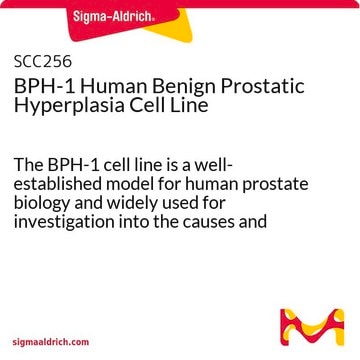SCCE019
Human Prostate Epithelial Cells, Adult
This prostate Cell line provides an ideal serum-free culture model, without retinoic acid, for the study of prostate cells when grown in our recommended medium.
Sign Into View Organizational & Contract Pricing
All Photos(1)
About This Item
UNSPSC Code:
41106514
eCl@ss:
32011203
NACRES:
NA.81
Recommended Products
biological source
human prostate (epithelial cells)
Quality Level
packaging
vial of 500,000 cells
manufacturer/tradename
Chemicon®
EpiGRO®
Millipore
morphology
(epithelial)
technique(s)
cell culture | mammalian: suitable
shipped in
liquid nitrogen
General description
Millipore’s Prostate Cell line, when grown in our recommended medium, provides an ideal serum-free culture model, without retinoic acid, for the study of prostate cells. Common uses for these cells are studies of hormonal regulation of the prostate, regulation and control of the secretory function of prostate cells and as a control for the study of prostate cancer. These cells are not exposed to antimicrobials or phenol red when cultured in EpiGRO Prostate Complete Media Kit. Prostate Cells are cryopreserved at passage 2 to ensure highest viability and plating efficiency.
This product is for Research Use Only. This product is not approved for human or veterinary use, or for use in in vitro diagnostic or clinical procedures
This product is for Research Use Only. This product is not approved for human or veterinary use, or for use in in vitro diagnostic or clinical procedures
Product Source: Human Prostate
Cell Line Origin
Prostrate
Cell Line Description
Epithelial Cells
Application
Please see data sheet for detailed directions on Thawing, Plating , Feeding, Passaging, etc.
Research Category
Stem Cell Research
Stem Cell Research
Packaging
500,000 cells
Components
SCCE019
Quality
Cells are negative for HIV (1,2), HBV, HCV, bacteria, mycoplasma and
fungal contamination.
Further growth: Guaranteed to provide 15 or more doublings when grown in the appropriate EpiGRO Medium.
fungal contamination.
Further growth: Guaranteed to provide 15 or more doublings when grown in the appropriate EpiGRO Medium.
Storage and Stability
To maintain the cells’ integrity, Millipore recommends unpacking the products immediately upon receipt and storing at a temperature lower than -150°C or in liquid nitrogen vapor phase.
Legal Information
CHEMICON is a registered trademark of Merck KGaA, Darmstadt, Germany
EPIGRO is a registered trademark of Merck KGaA, Darmstadt, Germany
Disclaimer
RESEARCH USE ONLY. This product is regulated in France when intended to be used for scientific purposes, including for import and export activities (Article L 1211-1 paragraph 2 of the Public Health Code). The purchaser (i.e. enduser) is required to obtain an import authorization from the France Ministry of Research referred in the Article L1245-5-1 II. of Public Health Code. By ordering this product, you are confirming that you have obtained the proper import authorization.
Unless otherwise stated in our catalog or other company documentation accompanying the product(s), our products are intended for research use only and are not to be used for any other purpose, which includes but is not limited to, unauthorized commercial uses, in vitro diagnostic uses, ex vivo or in vivo therapeutic uses or any type of consumption or application to humans or animals.
Storage Class Code
11 - Combustible Solids
WGK
WGK 1
Flash Point(F)
Not applicable
Flash Point(C)
Not applicable
Certificates of Analysis (COA)
Search for Certificates of Analysis (COA) by entering the products Lot/Batch Number. Lot and Batch Numbers can be found on a product’s label following the words ‘Lot’ or ‘Batch’.
Already Own This Product?
Find documentation for the products that you have recently purchased in the Document Library.
Andras Franko et al.
Genes, 11(10) (2020-10-11)
Prostate cancer (PCa), the most incident cancer in men, is tightly regulated by endocrine signals. A number of different PCa cell lines are commonly used for in vitro experiments, but these are of diverse origin, and have very different cell-proliferation
Katharina Wissmiller et al.
Molecular metabolism, 71, 101706-101706 (2023-03-18)
The insulin/insulin-like growth factor 1 (IGF1) pathway is emerging as a crucial component of prostate cancer progression. Therefore, we investigated the role of the novel insulin/IGF1 signaling modulator inceptor in prostate cancer. We analyzed the expression of inceptor in human
Our team of scientists has experience in all areas of research including Life Science, Material Science, Chemical Synthesis, Chromatography, Analytical and many others.
Contact Technical Service





